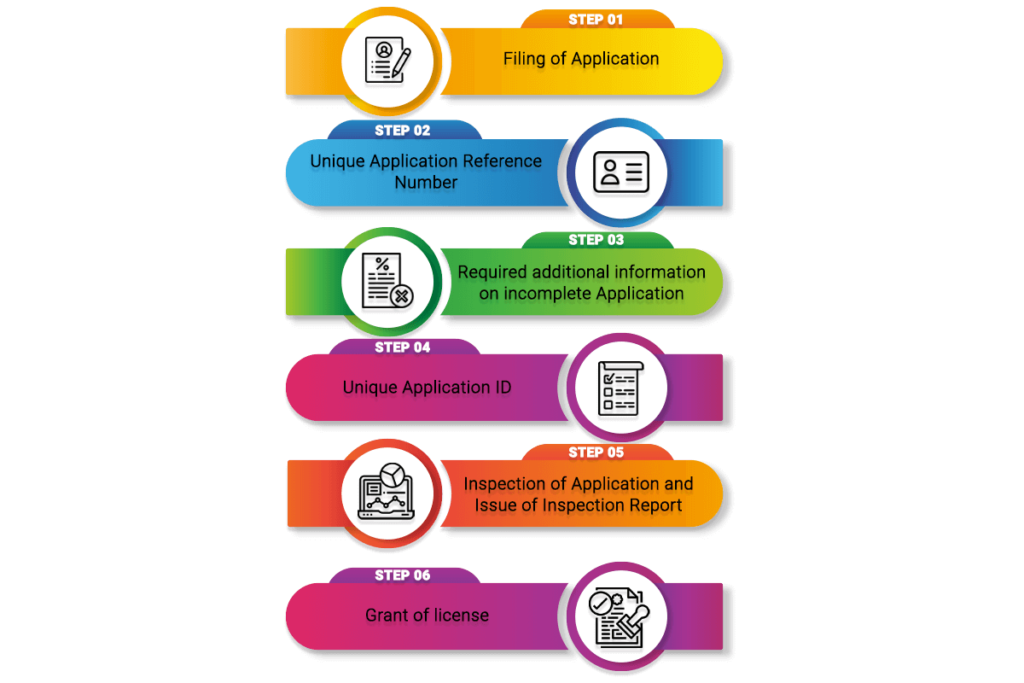An Overview – FSSAI Registration
Any entrepreneur who wants to start a business in the food sector, be it food processing or food manufacturing, packaging, or distributing, has to register for Food Safety and Standard Authority of India FSSAI.
1. What is FSSAI?
FSSAI stands for the Food Safety and Standards Authority of India which is an organization that monitors and governs the food business in India. It is an autonomous body that is established under the Ministry of Health & Family Welfare, Government of India.
The FSSAI has been established under the Food Safety and Standards Act, 2006 (FSS Act) which is a consolidating statute related to food safety and regulation in India. It ensures the food products undergo quality checks thereby curtailing the food adulteration and sale of sub-standard products. It is responsible for the registering and licensing of the Food Business Operators (FBO) in India and it lays down the rules and regulations for running the food business in India.
FSSAI Registration ensures the security of food products and it is essentially a food safety certificate circulated by the food authority in India. All the manufacturers, traders, restaurants, grocery shops, importers and exporters, etc are eligible for issuing FSSAI Licence. FSSAI Licensing assures that food products undergo specific quality checks, thereby decreasing the cases of adulteration, substandard products.
2. Why is FSSAI Registration Required?
Every food business operator involved in the manufacturing, processing, storage distribution and sale of food products must compulsorily obtain FSSAI Registration or License.
FSSAI Registration is different from FSSAI License in the sense that depending on the size and nature of the business, FBO should obtain the necessary registration or license.
It is a 14-digit registration or a license number which is printed on all the food packages. The 14 digit registration number gives details about the assembling state, producer’s permit. This registration procedure is aimed to create more accountability on the FBO to maintain the quality of the food products. The licensing and registration procedure and requirements are regulated by Food Safety & Standards (Licensing and Registration of food Business) Regulations, 2011.

3. We provide FSSAI online registration and licenses all over India.
We can help you to get an FSSAI License which can intensify the quality of your food if you are interested in the food business in India.
- Expert Advice and FSSAI eligibility consultation.
- Application Drafting for FSSAI Registration.
- 14-Digital FSSAI License number.
- Product Category clarification.
- Timely Follow- up With FSSAI Department.
- FSSAI Renewal before the expiry.
- Legal documentation on a need basis.
- Open to offer Basic Registration, State Registration, and Central Registration.
4. FSSAI Registration/License Procedure
FSSAI registration or license is based on the business volume and premises. Depending upon the installed capacity or turnover or location, applicant premises are eligible for the license such as basic license, central license, and state license.
5. Types of FSSAI Licence
Businesses engaged in food activities are required to apply for food licence of different types based on turnover, scale of business and the type of activity. The Types of FSSAI Food licence are as follows:
- FSSAI Basic Registration
The FSSAI registration is for food business operators (FBOs) which have small-sized business or start-ups. They have their annual turnover less than Rs.12 Lakh. Basic registration can be upgraded depends on your business sales graph productivity.
- FSSAI State license
The State FSSAI License is for the FBOs which have medium- size business. They have their annual turnover more than Rs. 12 Lakhs or up to Rs.20 crores. The state licence can be further upgraded to central licence all depends on your business sale graph productivity.
- FSSAI Central license
The Central FSSAI License is applicable for FBOs which have large business annual turnover i.e. above Rs.20 crores. It is also required in cases where you need to supply at the government offices or import / export food products.
6. FSSAI Registration Requirements
FSSAI Registration is a basic license and it is required for all the FBO involved in the small-scale food business. This category covers the following businesses:
- Any FBO with an annual turnover of not more than Rs. 12 lakh.
- Petty retailer dealing in food products
- Any person who manufactures or sells any food article by himself
- Food sale is done by the temporary stall holder
- Any individual who distributes food in any religious or social gathering except a caterer
- Small-scale or cottage industries dealing in the food business and the following:
| Sl.No | Business | Capacity |
| 1 | Food production capacity (other than milk and meat) | Up to 100 kg/ltr per day |
| 2 | Procurement, handling and collection of milk | Up to 500 ltr per day |
| 3 | Slaughtering capacity | 2 large animals or 10 small animals or 50 poultry birds per day or less |
7. Procedure for Obtaining FSSAI Registration
- FSSAI registration is initiated by submitting Form A (application) to the Food and Safety Department.
- This application can be accepted or it may be rejected by the Department within 7 days from the date of receipt of an application and the rejection has to be intimated to the applicant in writing
- If the application is accepted, then the department will grant a registration certificate with the registration number and the photo of the applicant.
- FBO should prominently display the certificate of registration at the place of business during the business hours.
The common documents required for Basic, State and Central Registration are a passport photo and a photo ID proof.
For State and Central license, the following additional documents will be needed:
- Address proof
- List of food category
- Layout plan
- List of equipment
- NOC from municipality
- Incorporation certificate
- List of directors/partners
- MOA and AOA
- Water test report
- Import Export Code
8. FSSAI License Requirement
For all other FBO apart from small-scale business, FSSAI license has to be obtained. FSSAI License can be classified into two categories i.e. State FSSAI License and Central FSSAI License based on the size of the business whether it is a medium scale or large scale business.
Generally, FBOs who are large manufacturers, importers, exporters dealing in large-scale food businesses need to obtain FSSAI registration from central government and FBO with small to medium-sized manufacturing units, transporters, marketers, traders, etc., need to take FSSAI registration from the state government. To apply for State License the FBO must have a turnover between Rs 12 lakh to Rs 20 crore.
Other conditions include manufacturing units having a capacity of 2MT per day, dairy units handling business up to 50000 liters per day. 3 star hotels and above, repackers, relabelling units, clubs, canterns all catering business irrespective of their turnover need to apply for the license. The tenure of the license being a maximum of 5 years and a minimum of 1 year.
To apply for a central license the FBO must have a turnover exceeding Rs. 20 crores and needs to have operations in two or more states. All importers and exporters need to apply for this license. The maximum tenure is 5 years and the minimum is 1 year.
9. Documents Required For Obtaining the Central License:
- Form B duly completed and signed
- Plan of the processing unit showing the dimensions and operation-wise area allocation
- List of Directors/ Partners/ Proprietor with address, contact details, and photo ID
- Name and list of equipment and machinery used with the number and installed capacity
- List of food category to be manufactured
- Authority letter from manufacturer nominated a responsible person name and address
- Analysis report of water to be used in the process to confirm the portability
- Source of raw material for milk, meat etc
- Recall plan wherever applicable
- Ministry of Commerce Certificate for 100% EOU
- NOC/PA document issued by FSSAI
- IE code document issued by DGFT
- Form IX
- Certificate from Ministry of Tourism
- Proof of possession of premises
- Partnership deed/ affidavit of proprietorship
- NOC and copy of License from the manufacturer
- Food safety management system plan or certificate
- NOC from the municipality or local body
- Supporting document for proof of turnover and transportation
- Declaration form
10. Documents required For Obtaining the State License:
- Form B duly completed and signed
- Plan of the processing unit showing the dimensions and operation-wise area allocation
- List of Directors/ Partners/ Proprietor with address, contact details, and photo ID
- Name and list of equipment and machinery used with the number and installed capacity
- List of food category to be manufactured
- Authority letter from manufacturer nominated a responsible person name and address
- Analysis report of water to be used in the process to confirm the portability
- Proof of possession of premises
- Partnership deed/ affidavit of proprietorship
- NOC and copy of License from the manufacturer
- Copy of certificate obtained under Coop Act 1861/Multi state Coop Act 2002
- Food safety management system plan or certificate
There are different forms and documents which are required to be submitted conversion, renewal, and modification of the license.
11. Benefits of Procuring FSSAI Food License
Obtaining a license can provide the food business with legal benefits, build goodwill, ensure food safety, create consumer awareness, and assist in business expansion. Also it helps regulate, manufacture, storage, distribution and sale of import food.
12. FSSAI License Validity
FSSAI license rules are hard and fast. FSSAI licenses issued to food businesses are valid for a period of 1 to 5 years. It is mandatory to apply for license renewal 30 days before the expiry of the existing license. Non-renewal of licenses can fetch a fine of Rs.100 per day until the renewal is done . Any lapse in renewal within the stipulated date can result in the old license becoming defunct and businesses will have to apply for a fresh license.
13. Consequences of Non-Compliance
Any registered or licensed person under the FSSAI has to adhere to the rules and regulation under the FSS Act, 2006. Food safety officer generally conducts the inspection of the food business operator’s facility and identifies the level of compliance with the regulation using a checklist. Based on the compliance level, the food safety officer marks it as:
- Compliance (C)
- Non-compliance (NC)
- Partial compliance (PC)
- Not applicable/Not observed (NA)
Based on the above, the food safety officer might issue an improvement notice where ever required per Sec 32 of the FSS Act, 2006. If the business operator fails to comply with the improvement notice, the officer after giving the licensee an opportunity to show cause may cancel his license. Any food business operator aggrieved by an improvement notice can appeal to the State Commissioner of Food Safety. The decision thereon can be challenged through appealing to the Food safety appellate tribunal/high court.
14. Penalty for Non- Compliance
Listed is the penalty for various type of non-compliance:
| Sl.No | Particulars | Fine |
| 1 | Food quality not in compliance with act | 2 Lakh Petty manufacturer – 25,000/- |
| 2 | Sub-standard food | 5 Lakh |
| 3 | Misbranded Food | 3 Lakh |
| 4 | Misleading advertisement or false description | 10 Lakh |
| 5 | Extraneous matter in food | 1 Lakh |
| 6 | Failure to comply with Food safety officer direction | 2 Lakh |
| 7 | Unhygienic processing or manufacture | 1 Lakh |
15. Renewal of FSSAI License
The FSSAI license is essential to commence the food business, similarly it is imperative to renew the license. The license is issued for a validity of 1 year or 5 years, so the business must apply for renewal 30 days prior to the expiry of current license. FSSAI has introduced an online application called Food Licensing and Registration System (FLRS) so businesses can apply online for the licences.
The FLRS is utilized in five Regional Offices for the issue of licenses and entitlements. They are:
- Northern Region -New Delhi
- Eastern Region – Kolkata
- North Eastern Region – Guwahati
- Western Region – Mumbai and Kerala
- Southern Region – Chennai
Frequently Asked Questions –
FSSAI Stands for “Food Safety and Standard Authority of India. FSSAI is an Independent organization under the Ministry of Health. FSSAI Registration is mandatory for every individuals or entity that is eligible for an FSSAI food safety Registration or License.
Maintaining the food quality levels in order to ensure safety and providing satisfaction to every consumer is the aim of every Food Business Operator. Food safety and standards authority of India (FSSAI Registration) plays an important role in formulating the controlling procedures.
The full form of FSSAI is the Food Safety and Standards Authority of India.
FSSAI Licence Registration can be easily applied online. But you will require an expert to complete the application procedure. For more details call us on 8560858551.
The types of FSSAI Food licenses are :
• Basic FSSAI Registration- Annual turnover of less than Rs. 12 Lakhs
• State FSSAI Licence- Annual turnover between Rs.12 Lakhs- Rs. 20 crores
• Central FSSAI Licence- Annual turnover more than Rs.20 crores
FSSAI has introduced an online application that is named as FLRS. It is a ‘Food Licensing and Registration System’- verifies for the eligibility of food-related business based on their business area and the kind of procedure recognized with the business person. This system is introduced for business visionaries linking to food that can apply online for the FSSAI license. The FLRS is used by 5 Reginal Offices of FSSAI that are in New Delhi, Kolkata, Mumbai, Chennai, Kerela.
FSSAI license renewal can be done for 1-5 years and it is necessary for every food business in India. You can contact our experts on 8560858551 and get to know your FSSAI license renewal status by them.
Yes, you have to take a Central FSSAI license for the main branch or head office and the state licenses for any specific state. To assure stable business operation for food business crossing over various states of the country.
Yes, you will be needed to get a central license from the address included in the Import Export Code. For import-export FSSAI central license is necessary.
In case of the death of the FSSAI license holder, the FSSAI license can be shifted to the legal representative or any family member of the dead holder. The legal representative or the family member needs to apply to the concerned Authority to shift the license in his/her name.
The Food License being issued to an eatery, food joint or a restaurant is sometimes called a Restaurant License. Therefore the process to get a restaurant license is the same as all other Food Licenses. All such restaurants must display their FSSAI registration at a prominent place, during all business hours. To make sure it is visible to all the customers, employees and other stakeholders.
Hazard Analysis Critical Control Point or HACCP is a globally acknowledged standardizing authority for preventing physical, chemical and/or microbiological contamination anywhere in the food supply chain.
To ensure that their product is safe and free from contamination, FBOs should implement a valid Food Safety Management System (FSMS) based on HACCP and suitable prerequisite arrangements. It will assist them in actively checking and controlling hazards throughout the food chain. At all stages in their business operations.
As per FSSA, 2006 regulations, an FBO has to file annual returns to the FSSAI Department before 31st May of the coming financial year. The returns are to be submitted in Form D-1. It comprises details about business activities such as the quantity produced or Export or Import Value.
An efficient Food Safety Management System or FSMS keeps a check on every step involved in the product (food) handling. It is implemented to ensure that food is processed, packed, produced, and stored safely. And that the hygiene is maintained at every single step. It includes good practices, hazards analysis management, system statutory, regulatory requirements and communication. All these objectives can only be achieved by involving all associates and employees.
Yes. You need to print FSSAI License number on product you sell or distribute or store.






